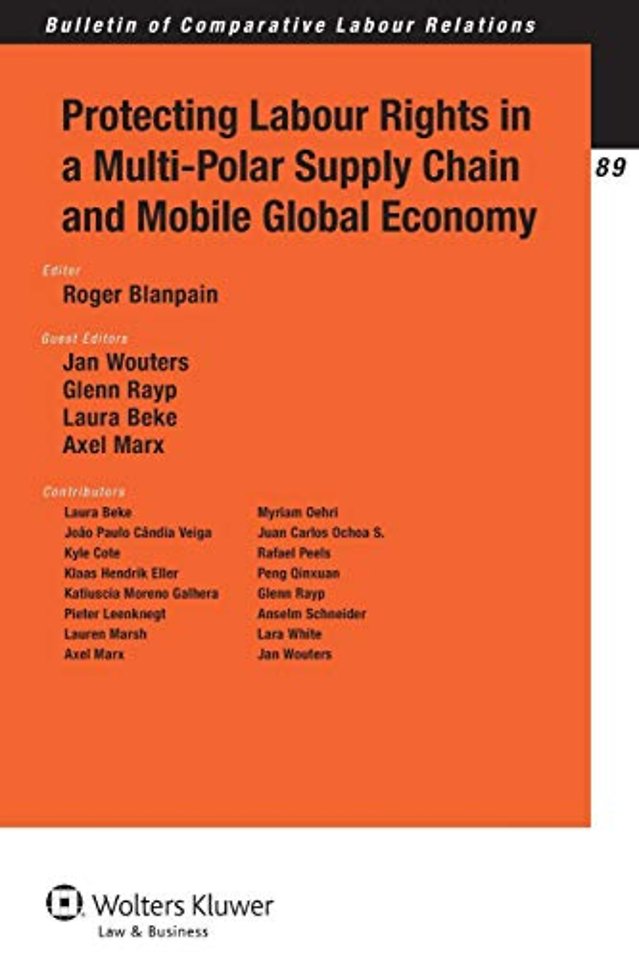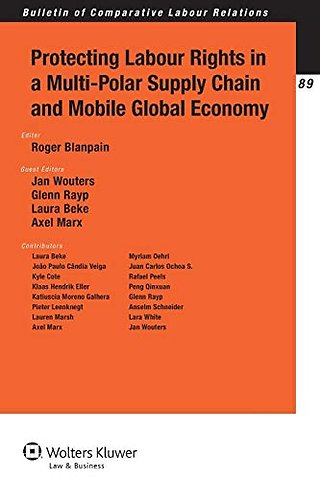Protecting labour rights in a multi-polar supply chain and mobile global economy
Samenvatting
Bulletin of Comparative Labour Relations Series Volume 89
In this important volume, nine studies identify the complexities of protecting
labour rights in a mobile global economy by assessing the role of ILO
standards, as well as public, private, and public-private initiatives, in
countering the potentially negative impact of international trade and
investment flows on labour rights.
The editor’s powerfully summative introduction and conclusion pinpoint the
crucial issues confronting labour law in this context, highlighting the need
for policy coordination and coherence. Among the topics and issues raised in
the book are the following:
- empirical studies of migrant workers employed in global supply chains;
- international recruitment intermediaries;
- governance through hierarchy versus governance through networks;
- trade sustainable impact assessments (SIAs);
- the so-called governance triangle – the state, companies, and non-governmental
organizations (NGOs);
- corporate social responsibility (CSR) initiatives; and
- the OECD’s national contact points (NCPs).
Various authors focus on such features as the difficulties of monitoring
labour conditions in a supply-chain system, the multiple forms of disadvantage
often faced by supply-chain workers, enforcement and jurisdictional
roadblocks, and pitfalls caused by prioritizing quantitative modelling at the
expense of qualitative analysis. Authors and editors both offer
recommendations on ways to not only hold multinationals responsible for the
negative externalities of their actions but also provide building blocks for
effective global supply-chain regulation.
Specificaties
Inhoudsopgave
Protecting Labour Rights in a Multi-polar Supply Chain and Mobile Global Economy: An Introduction Axel Marx, Jan Wouters & Laura Beke.
Chapter 1 Monitoring Precarious and Forced Labour in Brazil: Sweatshops in São Paulo from a Gender Perspective João Paulo Cândia Veiga & Katiuscia Moreno Galhera.
Chapter 2 Multi-layered Gaps between ILO Conventions and the Chinese Legal Protection for Migrant Women Workers as Domestic Helpers in China Peng Qinxuan.
Chapter 3 Approaches in Promoting Fair and Ethical International Labour Recruitment Lara White & Lauren Marsh.
Chapter 4 EU Trade Policy and International Labour Standards: The View from the ILO Pieter Leenknegt.
Chapter 5 US and EU Labor Governance in the Dominican Republic: Contrasting the DR-CAFTA and the CARIFORUM-EPA De Jure and De Facto Myriam Oehri.
Chapter 6 European Union Trade Sustainability Impact Assessments: Developing Coherence between Trade Agreements and Labour Standards Kyle Cote.
Chapter 7 The Potential Role of the ILO to Enhance Institutional Coherence on CSR in International Trade and Investment Agreements Rafael Peels & Anselm Schneider.
Chapter 8 An Empirical Examination of the Function of the OECD National Contact Points to Handle Complaints on an Alleged Breach of the OECD Guidelines for Multinational Enterprises Juan Carlos Ochoa S.
Chapter 9 Towards a Reflexive Juridification of Private Governance Instruments: The Case of Labor Standards Klaas Hendrik Eller.
Conclusion: Enforcement Gaps and Fragmentation in Global Labour Governance Axel Marx, Jan Wouters & Glenn Rayp.
Anderen die dit boek kochten, kochten ook
Net verschenen
Rubrieken
- aanbestedingsrecht
- aansprakelijkheids- en verzekeringsrecht
- accountancy
- algemeen juridisch
- arbeidsrecht
- bank- en effectenrecht
- bestuursrecht
- bouwrecht
- burgerlijk recht en procesrecht
- europees-internationaal recht
- fiscaal recht
- gezondheidsrecht
- insolventierecht
- intellectuele eigendom en ict-recht
- management
- mens en maatschappij
- milieu- en omgevingsrecht
- notarieel recht
- ondernemingsrecht
- pensioenrecht
- personen- en familierecht
- sociale zekerheidsrecht
- staatsrecht
- strafrecht en criminologie
- vastgoed- en huurrecht
- vreemdelingenrecht









